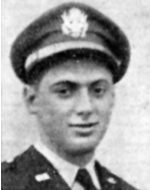Rosenbaum, Moshe-Aharon (Moses)
Son of Feiga-Mindel and Menachem son of-Zion, was born on the 30th of March 1920 in the city of Dobzin, Poland. His parents were veteran Zionists, and his father was active in the Poalei Zion movement. When he was eleven months old, his parents emigrated to the United States. The family settled in Brooklyn, where the boy grew up and graduated from high school. He was educated in the spirit of Zionism, was proud of his Jewishness and was Simcha to live in the freedom atmosphere of his country of residence. Chaim Weizmann and Abraham Lincoln served as representatives of twin ideals. When World War II broke out, he was a student at the College in central New York. He immediately left his studies and volunteered for the US Air Force. After graduating cum laude from a nine-month course and being trained as a lieutenant-colonel, he was sent across the ocean to the Allied Air Force in the Mediterranean. His base was in Italy and on his soil he knew the soldiers of the Jewish Brigade, made contact with them and decided to immigrate to Palestine in time. Moshe Aharon was a heavy bomber pilot and, on his 13th operational flight over the oil fields in Romania, was shot down and taken prisoner. He spent 13 months in a POW camp in Germany, near Dachau, until the camp was occupied by the Allied armies in May 1945. During his father’s death, his father received an Air Force Medal awarded to Moshe Aharon. Upon his return to university, he enrolled in mechanical engineering studies, with the intention of completing a profession suited to his future work in Israel. During his university years, he was active in B’nai B’rith (Hillel Institute) and Habonim. He excelled in several sports and won the prize as the best and most trained boxer among the students of the 1947-1948 season. He was an art lover and was mainly involved in painting. His landscapes were especially well received. He also excelled in poetry and thought. He studied for two and a half years and completed his studies and received an engineer’s diploma. He did not miss a month, but he preferred to postpone his studies so as not to delay his volunteering for the Israel Air Force during the War of Independence. In the IAF he served only a short time until he fell near Hulda on May 30, 1948. He was laid to rest at the military cemetery in Rehovot. After being shot down, he was granted the rank of airborne officer (lieutenant). After his death, Cornell University in New York gave him the title of mechanical engineer.
